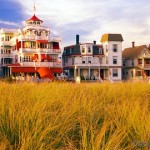The Wilderness of Childhood (or Wildness) was my favorite reading this week because of the connections it makes to my own life. Here is the connection: Last week, I vacationed with a friend in Cape May, New Jersey. This was the first time I had been there, very quaint indeed, and my friend had no interest in exploring town with me because she’d be there for 15 summers prior. So, I rented a bike and headed out for a morning ride with no agenda, restaurant, or path in mind. I ‘rambled’ throughout the neighborhoods of historical late 19th century Victorian homes, soaking in the architectural detail and famous landmarks. The freedom and uncertainty of this bike ride let me explore what I wanted, and think what I wanted. Out on my ride I witnessed people attending to their lawns and drinking their daily cup of Joe on the front porch, and kids on the street skate boarding. This one boy happened to wipe out right in front of me, luckily wearing his safety gear. Although he was playing outside and learning from his mistakes, he was being watched by a parent and protected by every piece of gear known to man.
So, what has happened in the last 50 years? The Wilderness of Childhood explains that kids sense of adventure of the wilderness has been suppressed by parents’ ideas that their child simply can’t explore without an adult, or without a phone. There were no cell phones 50 years ago, and parents couldn’t afford to watch their kids 24.7. What have children been deprived of in the last few decades besides video games and play structures? We learn from exploring, from making a wrong turn, from walking a city versus driving through one. We have to take chances and learn independence, and this class will give every student the chance to do that. Some of us might be afraid to hike or sleep out under the stars, but what do we really have to lose? 

I recently read this Washington Post article, “The decline of play in preschoolers and the rise of sensory issues” (http://www.washingtonpost.com/blogs/answer-sheet/wp/2015/09/01/the-decline-of-play-in-preschoolers-and-the-rise-in-sensory-issues/?postshare=1721441295677453). I thought this article clearly supplemented “The Wilderness of Childhood” reading with an example of how a lack of play or exploration impacts a child’s development. This article focusses specifically on preschoolers and sensory issues/lack of social skills due to an increased focus on academic development and a decrease in free play. According to this article, Children are becoming clumsier, more easily frustrated, and less likely to share and take turns. This article provides a more scientific look at childhood development to add to the narrative style presented in “The Wilderness of Childhood”.